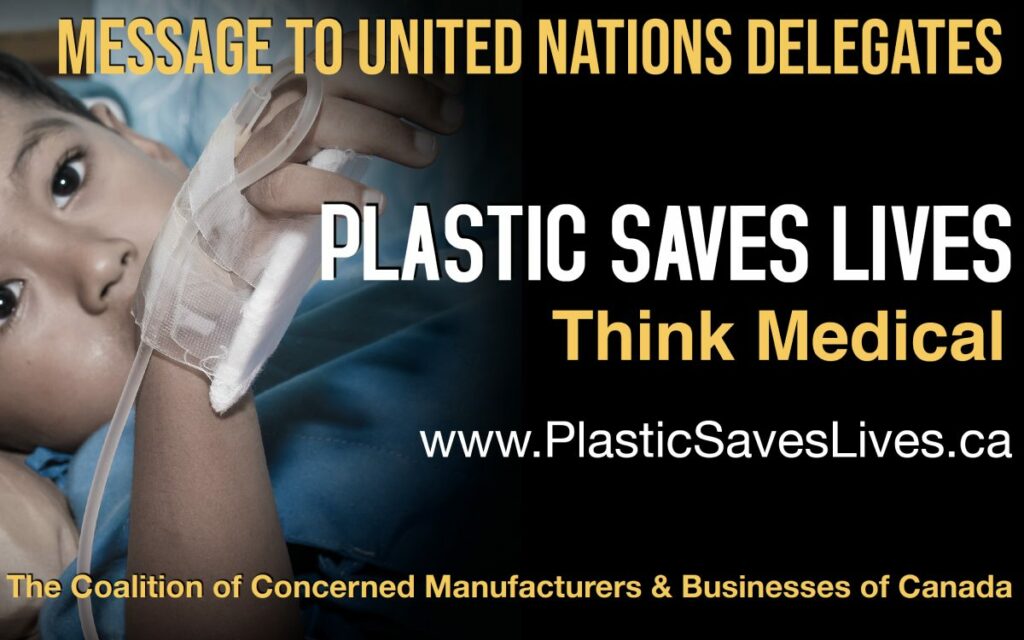
The bottom line is that plastics are irreplaceable in so many essential applications. Photo Credit: Coalition of Concerned Manufacturers and Businesses of Canada
In the next few days, thousands of UN bureaucrats are descending on our nation’s capital to participate in what is called INC-4 UNEP. Translated, this means the fourth meeting of the United Nations’ Environmental Program Intergovernmental Negotiating Committee. The objective of this group is “to develop an international legally binding instrument on plastic pollution, including in the marine environment.”
In March 2022 in Nairobi, Kenya, 175 countries endorsed an historic resolution to end plastic pollution and establish this legally binding agreement by the end of 2024. Time is running short and not a great deal of progress has been made. It doesn’t look like that end of 2024 deadline is going to be met no matter what transpires at this week’s meeting, as science and other realities have collided with the UN’s ideological priorities.
Ideally, the UN would like to ban all kinds of plastic products, including single-use plastics, and imposing a tax on plastics has also been discussed. The Trudeau government has set a goal of achieving zero plastic waste by 2030, a goal likely to join the rest of the Liberals’ climate targets as impractical, enormously expensive and unachievable.
As one would expect from the UN, they foresee the need for a massive, expensive bureaucracy in any country that decides to adopt this foolishness to monitor, implement, assess, collect data and report on progress. Our very own Environment Minister, the hapless Steven Guilbeault, has suggested he would like to see a plastics registry to track the entire life cycle of all plastics, with all of the costly burden of red tape that will impose on businesses of all sizes.
Our short-lived experience with banning a number of single-use plastics in Canada was fortunately ended as the Federal court shot down Guilbeault’s foolish ban last year, noting that it was unscientific to classify plastics as “toxic” and that the legislation was a federal intrusion on provincial jurisdiction. As is typical of someone driven exclusively by ideology and not facts, Guilbeault has surely not given up and we’re likely to see some further plastics-related legislation in the near future.
The one element of hope in the UN’s plans is that they also mention the importance of developing better recycling and reuse practices for plastic products. That is the true answer to plastics pollution. Most plastics are recyclable and some are virtually infinitely recyclable, yet we do not have enough infrastructure to fully accomplish this as yet. As well, there are many biodegradable plastics being invented that decompose in landfills, and the Canadian plastics industry is a world leader in that regard. The industry’s slogan is that “Plastics belong in the economy, not in the environment” and that is what they are working to achieve.
The bottom line is that plastics are irreplaceable in so many essential applications – such as medical devices, safety equipment, manufacturing, consumer and industrial products and so much more. Plastics frequently have positive benefits for the environment, such as making automobiles and airplanes lighter and more fuel efficient. Often the replacements for plastic are inferior and worse for the environment than the plastic they are replacing. Canadians saw that first-hand during Guilbeault’s ban with the terrible drinking straws that fell apart, take-out containers that leaked and unusable disposable cutlery.
At the UN meeting in Ottawa over the coming week, a number of business organizations are presenting a different view on the issue by emphasizing the undeniable advantages of using plastic products and the foolishness of measures to ban them as opposed to finding more practical solutions. The organization this author represents, the Coalition of Concerned Manufacturers and Businesses of Canada, will be conducting a campaign to highlight the many essential uses of plastic products and the impossibility of replacing them with anything even remotely comparable.
The extreme environmental groups will also be out in force – funded by our tax dollars – to promote the banning of plastic products that are vital to our health care system, sanitary food, our children’s safety, necessary consumer products and so much more. Hopefully our efforts and those of others will contribute to furthering Canadians’ understanding of the importance of plastic to our everyday lives and encourage our government to pursue practical, workable and affordable policies instead of ideologically driven pie-in-the-sky.

She has published numerous articles in journals, magazines & other media on issues such as free trade, finance, entrepreneurship & women business owners. Ms. Swift is a past President of the Empire Club of Canada, a former Director of the CD Howe Institute, the Canadian Youth Business Foundation, SOS Children’s Villages, past President of the International Small Business Congress and current Director of the Fraser Institute. She was cited in 2003 & 2012 as one of the most powerful women in Canada by the Women’s Executive Network & is a recipient of the Queen’s Silver & Gold Jubilee medals.




















